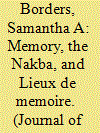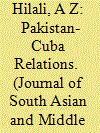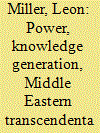| Srl | Item |
| 1 |
ID:
135690


|
|
|
|
|
| Summary/Abstract |
When considering the element that make up a cultural identity, a keen sense of the personnel is vital. in looking back at the events that have tied a people together, memory plays an essential role in preserving a history. in the case of Palestinian Nakba, or the catastrophe, that consisted of the ethnic cleansing of some 800,000 Arab from the region of British Mandate Palestin, its commemoration act as more than a point of reference for these people. Whether in diaspora or on the land itself, the corporate suffering caused by this instance has become a pivot in modern Palestine identity.
|
|
|
|
|
|
|
|
|
|
|
|
|
|
|
|
| 2 |
ID:
135688


|
|
|
|
|
| Summary/Abstract |
Non-interference in politics is one of the main doctrinal principles in Baha’ism. Articulated by Mirza Hussein Ali Noori (12 November 1817-29 may 1892), Bahaullah, the founder of Baha’i faith, this significant principle was supposed to prohibit Baha’i believers from any kind of involvement in politics in general, and of participation in political organization and parties in particular. This principle is widely perceived to be one of the main characteristics of Baha’ism, and a point of difference between it and its predecessor Babism.
|
|
|
|
|
|
|
|
|
|
|
|
|
|
|
|
| 3 |
ID:
135689


|
|
|
|
|
| Summary/Abstract |
In the contemporary state system diplomacy and foreign policy are the integral parts of world politics and both are perceived to be essential part of relationship and the effective instrument and important element for friendly and adversary countries in the world. Foreign relation with other countries is primarily of a diplomatic nature but countries extend economic, commerce, and cultural missions abroad to achieve political and strategic objective. Development in the world has enormously increased contracts, which demand the formulation of foreign policy according to a country’s interest.
|
|
|
|
|
|
|
|
|
|
|
|
|
|
|
|
| 4 |
ID:
135687


|
|
|
|
|
| Summary/Abstract |
twentieth century scholars have analyzed the middle east from a number of perspectives ranging from geopolitics, security studies, conflict studies, the Palestine-Israel conflict, fundamentalism (The War on Terror), and in connection with oil (Global political Economy). But it has only been recently that a small number of scholars have begun to research the interface between current trends in the Middle East (and North Africa) and corresponding current challenges that Western Civilization is confronted with.
|
|
|
|
|
|
|
|
|
|
|
|
|
|
|
|